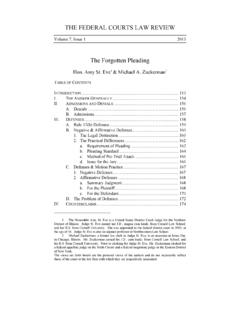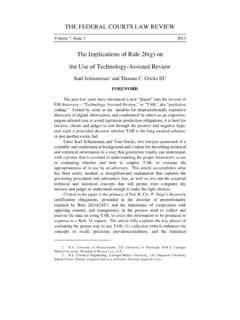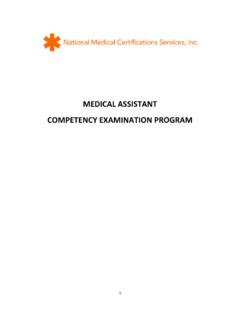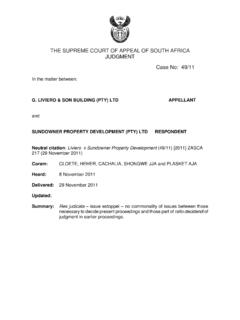Transcription of THE FEDERAL COURTS LAW REVIEW
1 THE FEDERAL COURTS LAW REVIEW Volume 5, Issue 2 2011 The Fraud Exception to the Rooker-Feldman Doctrine: How It Almost Wasn t (and Probably Shouldn t Be) Steven N. Baker TABLE OF CONTENTS I. INTRODUCTION .. 140 II. THE MISTAKE .. 144 A. The Beginning: Resolute Insurance Co. v. North Carolina and Res Judicata .. 144 B. The Fraud Exception to Res Judicata .. 146 C. In re Sun Valley Foods Co. and the Incorporation of Res Judicata s Fraud Exception into Rooker-Feldman .. 149 D. The Mistake s Proliferation .. 151 1. Cases Explicitly Citing In re Sun Valley Foods Co.
2 For the Exception .. 151 2. Recent Cases Inheriting the Intellectual Tradition from In re Sun Valley Foods Co.. 157 III. WHY THE MISTAKE S TIME HAS COME .. 159 A. A Mixed Reception .. 159 1. The Second Circuit .. 159 2. The Fourth Circuit .. 160 3. The Fifth Circuit .. 161 4. The Seventh 162 5. The Eighth Circuit .. 163 *Steven N. Baker is an associate at McGuireWoods LLP; , cum laude, 2007, Wake Forest University School of Law; , 2003, Brigham Young University. The views expressed herein are those of the author and do not necessarily represent the views of McGuireWoods.
3 The author would like to thank Judge Boyd N. Boland, Elizabeth Leverette, and the editorial staff of the FEDERAL COURTS Law REVIEW for their invaluable assistance. 140 FEDERAL COURTS LAW REVIEW [Vol. 5 6. The Tenth Circuit .. 164 7. The Eleventh Circuit .. 164 B. State COURTS Already Have Adequate Procedures for Self-Correction .. 164 1. A False Choice .. 164 2. Available State court Procedures .. 165 a. Rule 60(b) .. 165 b. Equitable or Inherent Power .. 167 C. COURTS Should Remember Rooker-Feldman s Origin and Purposes .. 168 IV. CONCLUSION.]
4 169 I. INTRODUCTION The Rooker-Feldman doctrine is familiar to any practitioner or academic who regularly deals with FEDERAL - court jurisdiction. The basic idea is simple: the lower FEDERAL COURTS do not have jurisdiction to reverse or modify a state- court Although this limitation was arguably implicit in the Judiciary Act of 1789,2 it was not until 1923 that the United States Supreme court made it an explicit part of FEDERAL court jurisprudence in Rooker v. Fidelity Trust The Supreme court revisited this limitation sixty years later in court of Appeals v.
5 Feldman,4 giving the doctrine the second half of its name. The lower FEDERAL COURTS took Rooker and Feldman and ran,5 declining to exercise jurisdiction over a great many cases, including some where the plaintiff s challenge, although arguably related to a state- court judgment, did not necessarily seek to have it reversed or modified. In 2005, the Supreme court again revisited the Exxon Mobil Corp. v. Saudi Basic Indus. Corp., 544 280, 283-84 (2005).
6 25 of the Judiciary Act of 1789, 1 Stat. 85. The current statutory basis for the Rooker-Feldman doctrine is 28 1257 (2006). See Susan Bandes, The Rooker-Feldman Doctrine: Evaluating its Jurisdictional Status, 74 NOTRE DAME L. REV. 1175, 1180 (1999) ( 28 1257 grants the Supreme court exclusive jurisdiction to REVIEW the judgments of the highest state COURTS . By inference, no other court , including a FEDERAL district court , has the power to do so. ). 413 (1923). 462 (1983). Suzanna Sherry, Judicial Federalism in the Trenches: The Rooker-Feldman Doctrine in Action, 74 NOTRE DAME L.
7 REV. 1085, 1087-90 (1999) (describing the Rooker-Feldman doctrine s explosive growth in the lower COURTS . Since 1990 alone, lower FEDERAL COURTS have used Rooker-Feldman to find jurisdiction lacking in more than 500 cases. ); see also Dustin E. Buehler, Revisiting Rooker-Feldman: Extending the Doctrine to State court Interlocutory Orders, 36 FLA. ST. U. L. REV. 373, 378-91 (2009) (also describing Rooker-Feldman s explosive growth in the lower FEDERAL COURTS ). 2011] Fraud Exception to the Rooker-Feldman Doctrine 141 Rooker-Feldman doctrine in Exxon Mobil Corp.
8 V. Saudi Basic Industries Corp., reining in the lower COURTS excessive jurisdictional declination and limiting the doctrine s application to cases brought by state- court losers complaining of injuries caused by state- court judgments rendered before the district court proceedings commenced and inviting district court REVIEW and rejection of those judgments. 6 At first glance, one would not think Rooker-Feldman, a jurisdictional doctrine, would be subject to a number of After all, jurisdictional inquiries are as close to being absolute as one gets in the law; the district court either does or does not have subject matter jurisdiction.
9 While principles of equity, fundamental fairness, and sound public policy have their place in the courtroom, they are not frequently raised to defend against a Rule 12(b)(1) motion to dismiss, and are even less frequently successful. A ready example is the amount in controversy necessary to plead diversity of citizenship. While there is not a great deal of difference between a plaintiff who pleads $75,000 in damages and another who pleads $75,001, this is a hard-and-fast jurisdictional line in the sand no matter how inequitable its application to a particular case might be.
10 And yet an exception to Rooker-Feldman of just such an equitable persuasion has taken root. A few COURTS most especially the United States court of Appeals for the Sixth Circuit8 have determined that Rooker-Feldman does not prevent the lower FEDERAL COURTS from reviewing state- court judgments that were allegedly procured through fraud. In other words, when a state- court loser complains that the winner owes his triumph not to sound legal principles or even unsound ones but to fraud, then the loser is not really complaining of an injury caused by a state- court judgment, but of an injury caused by the winner s chicanery.














